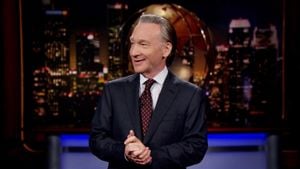The Eastern European political scene is undergoing significant upheaval, with key events influencing the regional power dynamics. Notably, Moldova's recent elections and the shifting alliances within Europe present both opportunities and challenges for the pro-European agenda amid rising pro-Russian sentiments.
On October 20, 2024, Moldova held pivotal presidential elections coinciding with a referendum on EU integration. President Maia Sandu championed the need to formalize Moldova's European orientation, aiming to secure long-term strategic alignment with Western institutions. This referendum was critically timed and posed as more than just a political maneuver; it was positioned as a safeguard against potential shifts back to pro-Russian governance following the elections.
Despite the overwhelming external pressures, including claims of Russian interference, the referendum passed by the slimmest of margins—50.38 percent approval—which reflects deep societal divisions on foreign policy direction. Moldova's electorate remains polarized, with divergences evident between urban areas, like Chisinau, where pro-European sentiment is higher, and more rural regions, including Gagauzia, where support for Russia prevails.
The influence of the Moldovan diaspora was substantial; their substantial backing contributed decisively to securing Sandu's administration and the referendum's narrow victory. This factor stands as evidence of the diaspora's commitment to the EU path, contrasting sharply with the sentiments felt at home.
Following these events, Sandu secured her position with approximately 55.35 percent of the votes against pro-Russian candidate Alexandr Stoianoglo, who garnered considerable support through disinformation campaigns and alleged bribing efforts. Election observers highlighted the blatant interference from Russian-backed entities, which sought to manipulate the electoral climate within Moldova.
Simultaneously, the rise of pro-Russian candidates across Eastern Europe unveils broader concerns. Countries like Hungary have openly allied with Russia, complicity stalling support for Ukraine. Similarly, results from Georgia's recent elections indicate support for the pro-Russian Georgian Dream party, undermining previously established ties with the EU.
This regional trend does not bode well for Ukraine, where the impacts of Donald Trump’s anticipated presidency loom large. Reports suggest his administration may push for negotiations favorable to Russia, potentially sacrificing Ukrainian territorial integrity for the sake of political expediency. Such outcomes could significantly alter the Eastern European political theater and destabilize the pro-EU coalition.
The growing presence of pro-Russian factions raises questions about the integrity of Western alliances. For example, Hungary's Prime Minister Viktor Orbán emerged as one of the most vocal critics of continued military aid to Ukraine, presenting Hungary as the gatekeeper among EU nations, blocking positive engagements for Ukraine.
Adding to the disquiet within the Eastern European political sphere is Moldova's historical claims to independence from Russian spheres of influence. Since gaining autonomy after the Soviet Union's dissolution, the political environment has been rife with external manipulation. Moldova's relationship with the breakaway region of Transnistria—supported militarily and politically by Russia—remains tenuous, resulting in decades of heightened tensions and mistrust.
With significant Russian military presence already embedded within Moldova, any shift toward pro-Russian leadership presents potential escalations. An authoritative presence from Moscow is marked as detrimental not only to Moldova but poses risks to neighboring states. With Russian President Vladimir Putin’s strategic interests steeped heavily within the region, his ambitions target not just Moldova but give him leverage to influence other nations.
Throughout these tumultuous developments, challenges to political stability raise alarms about Europe's overall security architecture. Reports indicate European discourse rebounding around the idea of universal military conscription, reflecting fears over the diminishing military capabilities across the continent. With nations hesitant to fully commit troops, the rhetoric of incorporating Ukrainian forces as primary defenders within Europe introduces new debates on military cooperation and support.
Should Trump continue the U.S. trend toward decreased global commitments, the questions of who will take up arms against any potential resurgence of Russian aggression remain disconcertingly pertinent. Discussions have begun to circulate around the potential need for Ukrainians to fill the vacuum of U.S. military presence—this, as they seek to bolster European defenses.
Moldova, too, faces scrutiny over its socio-political stability and economic resilience. The internal fractures evidenced during the election highlight existing societal divides exacerbated by external manipulation and economic vulnerability. The influence of Russian financing extends deep within local politics, diminishing trust across the electorate.
Transparent governance and reduced corruption are fundamental if Moldova aspires for future integration within the EU. Moving beyond recent electoral successes requires extensive community engagement to resonate the values and benefits of EU membership throughout the socio-economic spectrum.
Significantly, external factors constantly shape these dynamics. The aggression of Russia against Ukraine has not only emboldened pro-EU sentiments within Moldova but has crafted the narrative surrounding the necessity of cohesion against hostile forces. Moldova's citizens have stated their concerns ardently against Russian incursions, yet the looming threat remains divisive—fueling populism and nationalist sentiments against broader EU integration.
With the substantial hurdles presented through political stability needing immediate attention, Moldova’s position as the frontline of European-Russian influence continues to crystallize. Should the existing momentum uphold through societal engagement and structural reforms, additional confidence within European forums may strengthen Moldova's case against Russian hegemony.
Looking forward, the ability to cultivate and maintain strategic partnerships will be key. If the elections signal anything, it’s Moldova’s resolve to remain steadfast amid rapid geopolitical changes. The path toward EU integration is fraught with challenges, but with commitment from both the populace and the government, Moldova can assert itself as more than just another pawn within Eastern Europe’s chessboard.
Both Moldova and Ukraine symbolize the fight against external influences aiming to disrupt their aspirations for European alignment. Brussels’ response to these developments will shape not only their futures but will also redefine Western unity against broader threats present within this sector of Europe. Moldova's elections echo the sentiments of mistrust against Russian encroachment, and the guarantees for future security hinge on the vigor of international cooperation.



